
My review of Part II of SEC Network's "Southern Hoops: A History of SEC Basketball" which aired Monday February 6, 2023 and (loosely) covered the years 1960-1970).
My review of episode I is available here:
Begin🧵.....
@SECNetwork
My review of episode I is available here:
https://twitter.com/bigbluehistory/status/1622108498971574274?s=20&t=A31Urth4xmK4ORwMhTiraA
Begin🧵.....
@SECNetwork

(3:55) Mentions Auburn's decision to play game in Auburn Sports Arena on 20-FEB-1960. This was a refurbished Army World War II era quonset hut. UK played there once before in 1952 but subsequent games were played in Montgomery's Garrett Coliseum or Birmingham's City Auditorium. 







It's true Rupp railed against the poor facilities on SEC campuses and at times shamed them into spending money to improve their arenas. Besides Auburn Rupp complained about Vandy's Hippodrome 'roller rink' & Georgia's Woodruff Hall among others. 





(5:00) Jimmy Fibbe talks about hitting both free throws to beat UK go on to win SEC Championship.
bigbluehistory.net/bb/Statistics/…
Ray Groover scored 22 & Fibbe 17.
Doesn't mention that 11-3 Georgia Tech went to NCAA tourney instead as Auburn was on post-season probation.


bigbluehistory.net/bb/Statistics/…
Ray Groover scored 22 & Fibbe 17.
Doesn't mention that 11-3 Georgia Tech went to NCAA tourney instead as Auburn was on post-season probation.

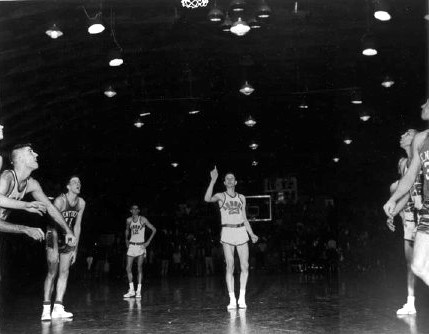

This was 6th time between 1954 & 1962 a different team other than reg. season champ went to NCAA tourney.
Year - Reg Season SEC Champ -> NCAA Rep
1954 - UK -> LSU
1956 - Alabama -> UK
1959 - Miss State -> UK
1960 - Auburn - G. Tech
1961 - Miss State -> UK
1962 - Miss State -> UK
Year - Reg Season SEC Champ -> NCAA Rep
1954 - UK -> LSU
1956 - Alabama -> UK
1959 - Miss State -> UK
1960 - Auburn - G. Tech
1961 - Miss State -> UK
1962 - Miss State -> UK
(12:08) Miss. State's Joe Dan Gold & Loyola (Chicago)'s Jerry Harkness talk about the "Game of Change" held on 15-MAR-1963 in Lansing Michigan.
Joe Dan Gold was a All-SEC player and Kentucky native, from Benton Kentucky.
Harkness an All-American guard for Loyola from New York.


Joe Dan Gold was a All-SEC player and Kentucky native, from Benton Kentucky.
Harkness an All-American guard for Loyola from New York.
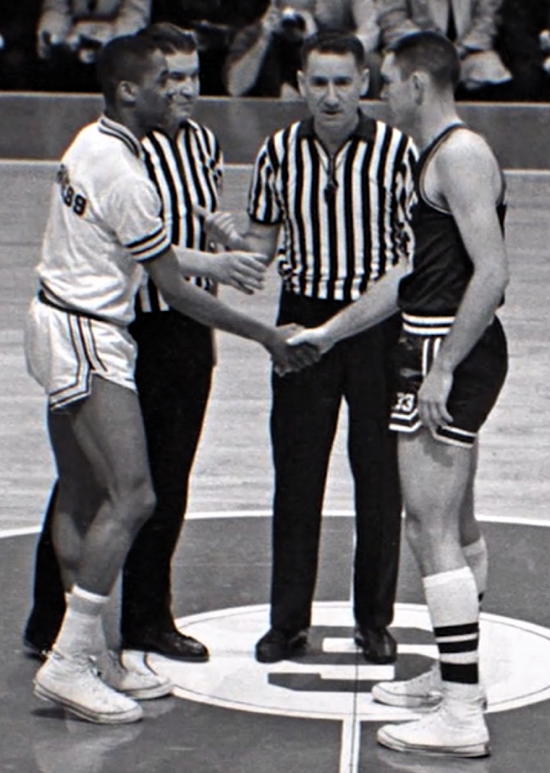


As an aside Kentucky had been playing Loyola on and off since 1949 where they met in the NIT. That is likely the 1st regular season game UK played against a black player, Ben Bluitt of Loyola.
bigbluehistory.net/bb/Statistics/…

bigbluehistory.net/bb/Statistics/…


(15:50) "Sometime in the early 1960s a young sportswriter at the NY Journal Am. named Jimmy Breslin got a call from Adolph Rupp in Ky. The coach asked a favor: To kindly indicate the black HS players ... with asterisks, so Rupp would know where not to send his recruiters." 🧐
Verdict? Could be true, but unconfirmed to my knowledge.
If happened, it was during late 50s or 1960, a time when Rupp was forbidden from recruiting black players. So it actually was a matter of practicality.
Breslin left NY Journal American ~1960.
If happened, it was during late 50s or 1960, a time when Rupp was forbidden from recruiting black players. So it actually was a matter of practicality.
Breslin left NY Journal American ~1960.
This charge is actually one that comes from Alexander Wolff, who has mentioned it many times in various SI articles & books since late 80's. Sometimes he mentions the player in question was Connie Hawkins, who played High School in NYC up to 1959-60 season.
@alexander_wolff
@alexander_wolff
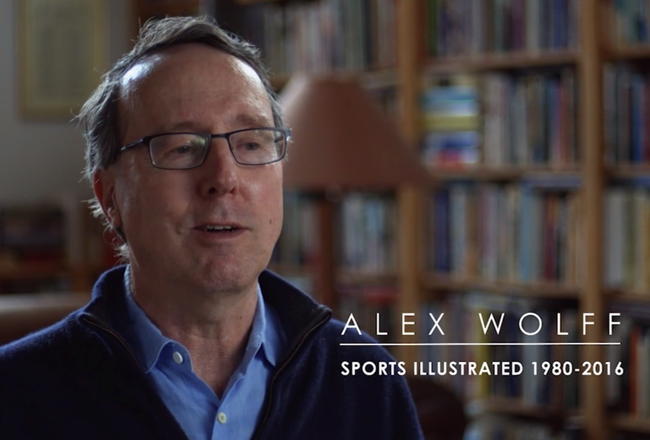
This has led some unscrupulous authors (Mike Lupica) to claim Rupp 'refused' to recruit Connie Hawkins.
Again it was never a practical option, Rupp wasn't allowed by UK administration to recruit black players at this time. It wouldn't be until late spring 1963 UK allowed it.
Again it was never a practical option, Rupp wasn't allowed by UK administration to recruit black players at this time. It wouldn't be until late spring 1963 UK allowed it.
Again, I was never able to confirm this with Breslin himself, nor find evidence Breslin ever personally wrote about it.
Wolff told me in 2016 that he had heard it as a 2nd hand rumor in 1970s while in college but can't remember it being verified.
Wolff told me in 2016 that he had heard it as a 2nd hand rumor in 1970s while in college but can't remember it being verified.
So again was this claim true? Who knows? But again, even if true, it was more a practicality than anything else. (A key point omitted by critics.)
Note the narrator was very vague in his wording of the supposed event. Still good enough for @SECNetwork to repeat as fact though.😢
Note the narrator was very vague in his wording of the supposed event. Still good enough for @SECNetwork to repeat as fact though.😢
(18:00) Bolin: "He would say his reluctance to recruit African American players was because of how they would be treated in the Deep South."
True, Rupp was very concerned how black players would be treated on road trips, knowing UK was already treated poorly by hostile crowds.

True, Rupp was very concerned how black players would be treated on road trips, knowing UK was already treated poorly by hostile crowds.

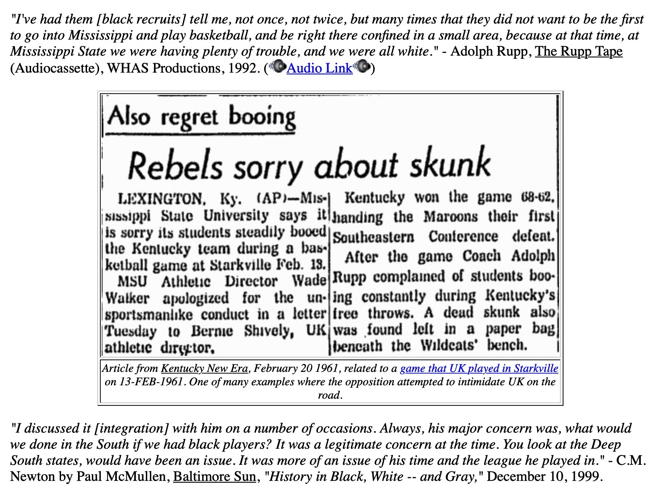
But I do take exception with Bolin's wording. Again, despite the concern, Rupp asked for & received permission to recruit black players, & did so starting with Wes Unseld when he was HS senior in 1963-64.
As mentioned, Rupp made efforts to better accommodate traveling in South.
As mentioned, Rupp made efforts to better accommodate traveling in South.

It's noteworthy the Civil Rights Act was not signed until 2-JUL-1964, which in theory (albeit not in practice) guaranteed accommodations in the South.
When Rupp was recruiting Unseld it was before this. Unseld signed LOI with UL in May 1964. The issue was a real one.

When Rupp was recruiting Unseld it was before this. Unseld signed LOI with UL in May 1964. The issue was a real one.


Rupp was known to approach numerous black players after games in the 1950's and tell them he wished he were able to coach them, citing having to travel into the South as a problem. But again that was only part of the story. He was not allowed to recruit them until 1963.
So while Rupp was concerned about it, and in fact consulted with people who had traveled in the Deep South with integrated teams (such as trainer Ron Murray with ⚾️ team Knoxville Smokies), I don't think it's fair to suggest it was an excuse he used not to recruit black players. 



(18:16) Smith: "If you come here, there's no guarantee we can protect you from the hostilities you'll encounter in the Deep South, but we want you to come. ... That was a way of saying we want you to come but we're not going to do all we can to make sure you'll remain safe." 

Smith is a highly respected history prof, but not an expert on Rupp by any means. He's no doubt paraphrasing.
It's true Rupp was honest with black recruits about the obstacles they'd face. But I dispute Rupp also didn't also vow he'd do everything they could to keep them safe.
It's true Rupp was honest with black recruits about the obstacles they'd face. But I dispute Rupp also didn't also vow he'd do everything they could to keep them safe.
Apparently some Rupp critics believe he should have lied to recruits about the issues. I think Rupp did the right thing being upfront & honest with them on the hardships they may face, even if it made his job harder & ultimately tarnished his legacy in the eyes of these critics.
(19:30) "In 1963 Rupp got a mandate from newly hired UK President John Oswald: Make an effort to recruit black players."
This is VERY misleading. UK had already announced their athletic programs were open to integration under UK President Frank Dickey, prior to Oswald.

This is VERY misleading. UK had already announced their athletic programs were open to integration under UK President Frank Dickey, prior to Oswald.


It was Dickey who did the legwork preparing both the UK Board of Trustees & the SEC in general for integration. This included sending surveys to each SEC school asking how they would respond, knowing that the result may end in UK being forced to leave the conference entirely. 



By late May 1963, and despite some negative feedback from some SEC schools, UK formally announced that effective immediately their athletic programs were open to all races & gave coaches the go-ahead to recruit black players, something both Rupp & the football coach had requested
Unfortunately for Rupp, by that time all scholarships were used. He'd have to wait until Spring 1964 to offer another, which he did with Unseld.
After Dickey left to take new job, Oswald (on left) was hired, but he didn't arrive on UK campus until September 1963.
More to come..

After Dickey left to take new job, Oswald (on left) was hired, but he didn't arrive on UK campus until September 1963.
More to come..


(20:08) Narrator: "In 1963 Rupp got a mandate from newly hired University President John Oswald: Make an effort to recruit black players."
Just because they repeat it twice, doesn't make it any more true.
Oswald was supportive of UK's integration efforts but did not drive them.

Just because they repeat it twice, doesn't make it any more true.
Oswald was supportive of UK's integration efforts but did not drive them.

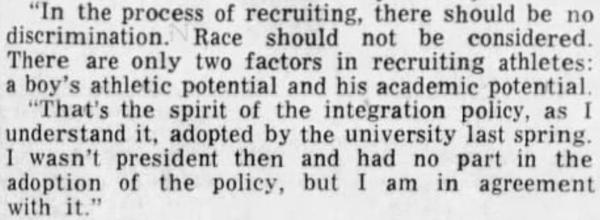
But the producers then proceed to add audio clips from years later, related to tokenism. This is a misrepresentation, either intentionally or out of their ignorance of subject.
At time of 1964 (Unseld), 1965 (Butch Beard), 1966 (Perry Wallace) Rupp was still recruiting Superman.


At time of 1964 (Unseld), 1965 (Butch Beard), 1966 (Perry Wallace) Rupp was still recruiting Superman.



Rupp consulted people like the LA Dodgers Branch Rickey on the best way to integrate his team, & decided to take their advice: players who could compete both athletically & academically & could retain their composure during hardships.
He thought Unseld, Beard & Wallace fit bill.
He thought Unseld, Beard & Wallace fit bill.

Unfortunately for Rupp, that didn't work out. By 1967 UK🏀had lowered their recruiting standards, but not to the extent that Oswald wanted.
The main difference between Rupp & Oswald was not whether to recruit black players, but whether to take a token black to mark off a box.
The main difference between Rupp & Oswald was not whether to recruit black players, but whether to take a token black to mark off a box.

Rupp was against tokenism, and had been his entire life. He knew it was a no-win situation to have a black player sitting on bench where opposing fans could target him, while others would pressure to play him regardless of skill. Oswald didn't care who it was they signed.
Beyond that, Rupp asked UK to relax their normal academic requirements to allow him to accept athletes who weren't meeting standards (a common practice today), in particular disadvantaged black players to increase his recruiting pool.
Yet Oswald was not receptive to the idea.


Yet Oswald was not receptive to the idea.



(20:20) Wolff: "There was a power struggle going on at Kentucky too. You had an all-powerful coach who wanted to do things the way he always had done them and didn't want outsiders meddling, and you had a new President from Minnesota who desperately wanted things to change." 
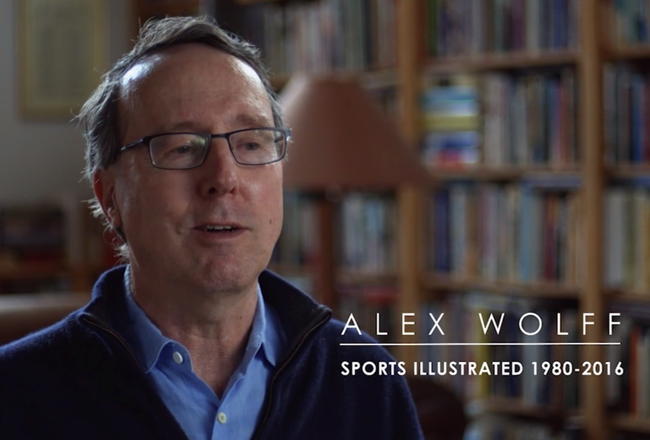
Again we have Alexander Wolff muddying up the story due to his own ignorance of the topic. True there was a power struggle of sorts, but Wolff gives WAY too much credence to Oswald. Frankly, Oswald did little to nothing to push or help the basketball program become integrated.
In the Oral History, Oswald did do a few things. He said he went to visit Wes Unseld in Louisville & also was said to help UK recruit & was present for UK football signee Nat Northington. 

But in the very same interview, Oswald made the curious claim that Rupp refused to visit Unseld in his home. This is absolutely false, & frankly bizarre because Rupp's visit to Louisville was not only well anticipated & reported, but one of the most discussed home visits ever. 





Just to be clear, Oswald started by claiming he never thought Rupp visited black players in their homes (not accurate & showing a lack of awareness). Oswald then claims he himself volunteered to visit Unseld, but doesn't say whether or not he invited Rupp to go with him.
Unlike Rupp's visit, Oswald's visit was never reported in the newspapers & I haven't seen it independently verified. But he says he did, so I assume that's true. It must have been after Rupp's visit because Oswald said Unseld told him he had already decided not to come to UK.
Oswald was clearly confused in his oral history, despite Terry Birdwhistell providing him news clippings & feeding him names & details. Oswald couldn't remember whether he went with assistant coach Harry Lancaster or AD Bernie Shively. Neither did he remember Unseld chose UL.
More notably, Oswald had little to no recollection of Butch Beard's recruitment the following year. Apparently Oswald had already checked out in terms of personally getting involved in recruitment. Beyond visiting Unseld & Northington, that seems the extent of his involvement
Notably in the interview, Oswald admits he did little to push integration of the school itself, other than crowing about his 2 visits in athletics. Black professors were hired during his tenure but not at his behest or urging. Birdwhistell mentioned 1st black professor ....
Sociology prof Joseph Scott hired by UK in Spring 1965 & Oswald seemed unaware of it, other than saying the name 'rings a bell'.
Oswald admits there were no special programs or outreach set up to improve the transition & welcome for black students or faculty under his watch.
Oswald admits there were no special programs or outreach set up to improve the transition & welcome for black students or faculty under his watch.

Yet somehow, Frank Fitzpatrick in his travesty of a book about the 1966 UK-Texas Western game, tried hard to push the idea Oswald was a great crusader for integration, with the evil Rupp as his foil. When the reality was Rupp did more than Oswald & more than he was credited for. 
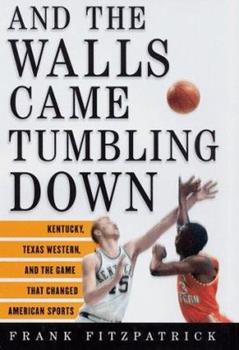
This somehow morphed into the idea (amplified by some writers) that Oswald asked Rupp to recruit Unseld but Rupp refused. When the truth was Rupp was already recruiting him & Oswald didn't help very much.
Excerpts from Wolff's & Andrew Maranniss' books. @trubu24
More to come...

Excerpts from Wolff's & Andrew Maranniss' books. @trubu24
More to come...


(20:26) Gerald Smith: "Lancaster concluded that Rupp was never really around black people and I think he was afraid of the unknown."
True to a point, but I think overstated & misleading. Despite his bravado to the media, Rupp was in my opinion a highly functional introvert.
True to a point, but I think overstated & misleading. Despite his bravado to the media, Rupp was in my opinion a highly functional introvert.

It could be said Rupp wasn't really comfortable around anyone outside his immediate family. Despite that, to single him out as not having been around black people previously is just not accurate.
Rupp was interacting with a few black people well before Lancaster even was around.



Rupp was interacting with a few black people well before Lancaster even was around.
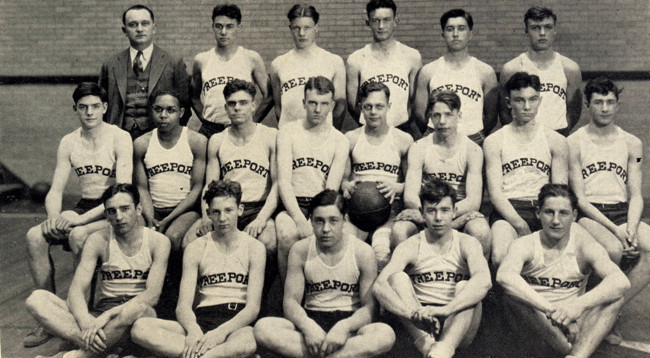



I'd also point out while the documentary emphasizes how hard-headed, obstinate & set in his ways Rupp was supposed to be, the implication being it led him not to recruit black players, the reality is he DID recruit them.
If anything it shows he was able to overcome his nature.
If anything it shows he was able to overcome his nature.
(20:35) Bolin: "Rupp very rarely went out to recruit himself, the players would come to him. In the early years he had cattle calls where he had 70 players that came out to try-out."
True, but again misleading with regard to this topic. Rupp typically didn't visit player homes.
True, but again misleading with regard to this topic. Rupp typically didn't visit player homes.

UK benefitted from fact they provided 🏀scholarships. Many other SEC schools didn't, so they were lower on pecking order.
Rupp did get spoiled in terms of recruiting. But again implication by producers that he didn't visit black recruit's homes is simply not true. Rupp adapted.
Rupp did get spoiled in terms of recruiting. But again implication by producers that he didn't visit black recruit's homes is simply not true. Rupp adapted.
This leads to truth not really mentioned in documentary, Rupp in the 1960s wasn't just failing to sign black recruits, he was failing signing top white recruits as well.
🏀was becoming a big business & Rupp's simple offers to apply & show up on campus weren't cutting it anymore.
🏀was becoming a big business & Rupp's simple offers to apply & show up on campus weren't cutting it anymore.
(21:38) Larry Conley talks about recruiting Unseld to UK. Nice to see Larry. Previous excerpt from 18-MAR-1964 LCJ mentions Larry's father, George, who was longtime SEC referee.
George Conley was not permitted to referee UK games while Larry was player.
bigbluehistory.net/bb/Statistics/…


George Conley was not permitted to referee UK games while Larry was player.
bigbluehistory.net/bb/Statistics/…



Rupp had similar run-ins with UK alums, telling them to return their season tickets if they didn't like him recruiting black players.
Below quote from former UK ass. coach Neil Reed in WKYT documentary by Dick Gabriel @bigblueinsider1 transcribed below:
bigbluehistory.net/bb/ruppmythleg…
Below quote from former UK ass. coach Neil Reed in WKYT documentary by Dick Gabriel @bigblueinsider1 transcribed below:
bigbluehistory.net/bb/ruppmythleg…

(21:56) Narrator: "Unseld instead chose to stay home, at the University of Louisville. Rupp also failed to bring in another Kentucky native, Butch Beard, in 1965."
This is breezed over by narrator but Beard came as close to coming to UK as anyone. A huge controversy...

This is breezed over by narrator but Beard came as close to coming to UK as anyone. A huge controversy...

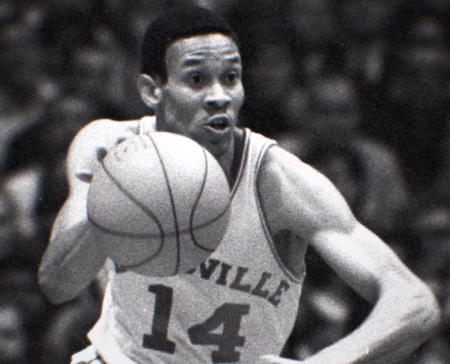
Beard had signed to play at UL (under questionable circumstances) but changed his mind & wanted to come to UK, at one point enlisting an attorney's help to get out of his committment. But UL & Missouri Valley Conf refused.
If Twitter were around then, it would have blown up!!


If Twitter were around then, it would have blown up!!



(22:38) Smith: "Butch Beard would even say years later that it was very apparent that Rupp was being forced to do this. This was not a serious effort."
Again I think Smith is paraphrasing here and frankly presenting a one-sided viewpoint, which happens to support his own...
Again I think Smith is paraphrasing here and frankly presenting a one-sided viewpoint, which happens to support his own...
Butch Beard has been pretty upfront about his recruiting by UK & Rupp over the years, saying both pos & neg things. As a UL grad, I expect him to give some favor to Louisville, but he's also been pretty fair, IMO.
Regardless, to claim UK didn't make a serious effort is bunk.
Regardless, to claim UK didn't make a serious effort is bunk.

(23:00) Audio of Rupp talking about his arguments with UK President Oswald, again most likely took place later (probably after Bernie Shively died in DEC 1967) when issue was more whether to pursue tokenism. This is not the complete audio, they cut parts.
bigbluehistory.net/bb/Audio/rupp_…
bigbluehistory.net/bb/Audio/rupp_…

Most notably they cut the part where Rupp asked for help from Oswald. But again, it seems after his two visits early on (Unseld & Nat Northington), Oswald was done helping athletics recruit. And he certainly wasn't going to help by relaxing academic requirements for athletes.
Rupp asking for help recruiting wasn't unusal. When black student activist Bill Turner (who was protesting UK's lack of black players) requested meeting with Rupp, Rupp not only accepted meeting, but asked Turner for help, which he did with Jim McDaniels and others. 



Not to slam Oswald but in comparison, in his oral history interview conducted by Terry Birdwhistell, Oswald didn't even seem aware that there was a black activist group (ORGENA) on campus.
And yet people want to praise Oswald for integration? I just don't know the basis for it.
And yet people want to praise Oswald for integration? I just don't know the basis for it.
Similarly, black UK microbiology professor George Hill was also critical of UK's failures at having a black player, but to his credit agreed to help Rupp and Joe Hall with recruits like Joby Wright (who ended up at Indiana) and others. 

While his critics kept assigning blame to Rupp alone, at least Rupp recognized it was a group effort & he was asking for help from the community.
Below from Courier-Journal article 1-JUN-1969 showing Rupp's response to Hill Letter to editor. 8 days later Rupp signed Tom Payne.


Below from Courier-Journal article 1-JUN-1969 showing Rupp's response to Hill Letter to editor. 8 days later Rupp signed Tom Payne.

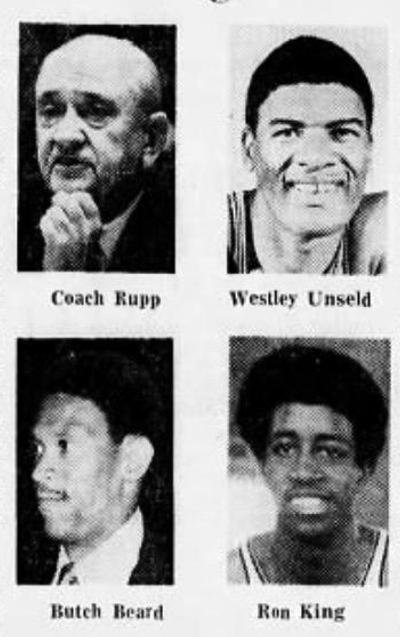

Sadly, black support for UK's efforts wasn't universal. While leading Ky civil rights leader Frank Stanley was supportive of Unseld & Butch Beard attending UK, Lyman Johnson, who sued UK in 1949 to enter graduate school, threatened a lawsuit to prevent UK FROM recruiting Beard! 







One factor, conveniently not mentioned, is there was growing support for steering black players to HBCUs. Kentucky State in nearby Frankfort built a powerhouse, winning two NAIA championships with players like 7-footer Elmore Smith, Travis "Machine Gun" Grant & Sam Sibert etc. 

And I think that's fine. They should try to get the best players they can.
I just find it hypocritical for some critics to actively push recruits away from places like UK, while at same time blaming Rupp for not being more successful recruiting the same players.
More to come...
I just find it hypocritical for some critics to actively push recruits away from places like UK, while at same time blaming Rupp for not being more successful recruiting the same players.
More to come...
(26:56) Narrator: "A week after the [UK-Texas Western] loss, a Lexington sportswriter proclaimed ... 'at least we're still the #1 white team in the country'"
Not noted was Rupp's response to Russell Rice: "By Gawd why'd he have to say that? I'm trying to recruit these boys."
Not noted was Rupp's response to Russell Rice: "By Gawd why'd he have to say that? I'm trying to recruit these boys."
Neither did the narrator note the poor response by the crowd or that fact that soon after the banquet, the person who made the comment, Billy Thompson, was fired from his job as sports editor of the Lexington Herald, despite having been with the paper since 1939. 

(27:03) Gerald Smith: "Why is everybody keep pointing to us recruiting negro players? We'll get some, when they can fulfill the academic requirements and play. He saw that as minor. But now that is major."
Again with the paraphrasing. Fact is Rupp was recruiting black players.
Again with the paraphrasing. Fact is Rupp was recruiting black players.
People point to the Texas Western as a watershed moment in changing Rupp's mind, but Rupp had known the need to recruit black players well before then. If there was a turning point for UK fans, it was likely 1964 losses in NCAA tourney vs. Ohio & in consolation to Loyoloa (IL). 





(27:58) Larry Conley: "I never really felt like that. We played other teams that had a lot of black players. We played Michigan, had 4 black players that started against us. And I never, ever thought about that."
Very true. UK had been playing integrated teams since late 1940s.
Very true. UK had been playing integrated teams since late 1940s.

Conley: "And anybody who comes up to me & starts talking about that situation, I say 'Yeah, that's just the way it is I guess.' & I let it go, I just let it go."
Sad Conley is distraught over these issues & often baseless claims. It's common for many @ UK to be worn down by it.
Sad Conley is distraught over these issues & often baseless claims. It's common for many @ UK to be worn down by it.

(29:30) Mike Pratt: "I think we missed a golden chance to have a black player on our team. I think that's something that, you look back on life and think 'Gee whiz what if that would have happened'?"
Agree. This was a huge missed opportunity. Multiple black players actually.
Agree. This was a huge missed opportunity. Multiple black players actually.

Talks about Perry Wallace having games cancelled & being harassed in Mississippi etc.
At Kentucky he found sanctuary, where he could simply play the game. From Andrew Maraniss' @trublu24 book on Wallace, Strong Inside:

At Kentucky he found sanctuary, where he could simply play the game. From Andrew Maraniss' @trublu24 book on Wallace, Strong Inside:


While visiting Lexington as a freshman, LCJ's Billy Reed interviewed Wallace on the struggles encountered being a pioneer in the SEC. The interview "Wallace of Vandy: A Reluctant Pioneer" is reprinted on the following page:
bigbluehistory.net/bb/perrywallac…
Issel & Wallace had a battle.

bigbluehistory.net/bb/perrywallac…
Issel & Wallace had a battle.

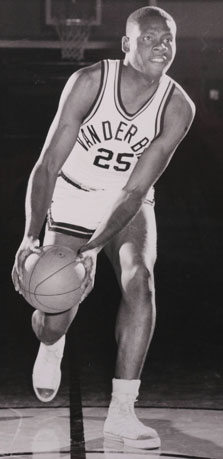
(39:04) Marannis "Adolph Rupp was really sort of in charge of the rules committee process at that time and he had Perry Wallace coming into his league. The dunk is outlawed. Perry felt it was an unjust rule directed at black players."
Questionable. Rupp wasn't on rules commitee.
Questionable. Rupp wasn't on rules commitee.
In fact Maraniss in his own book confirms this, yet still tries to push his theory.
From what I've seen, the committee (which did NOT include Rupp) was conflicted over topic. Truth is dunking was dangerous at time, due to issues with rungs on hoop, lack of breakaway rim etc.


From what I've seen, the committee (which did NOT include Rupp) was conflicted over topic. Truth is dunking was dangerous at time, due to issues with rungs on hoop, lack of breakaway rim etc.

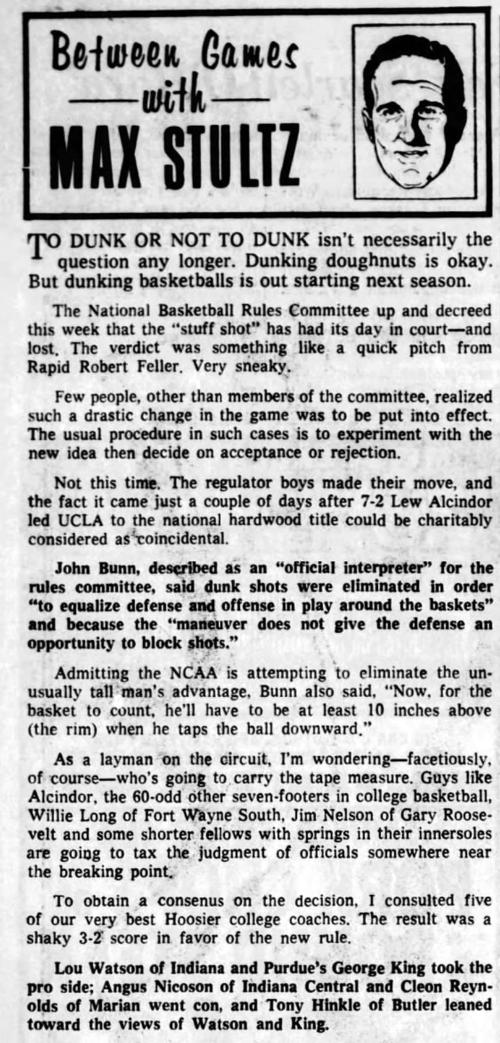

It is true that at time of the ban, Rupp was publicly against the dunk. Whether he used his influence on ban, I haven't seen any evidence either way. He did change his mind on it a few years later.
Rupp did allow his players at UK to dunk in practice & sometimes during warm-ups.
Rupp did allow his players at UK to dunk in practice & sometimes during warm-ups.
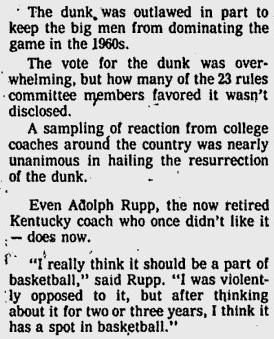
Most notably 6-8 center Marion Cluggish was instructed by Rupp to dunk in pregame warmups in Madison Square Garden in 1930s to intimidate the opponent.
Bill Spivey also had a famous break-away dunk in a December 1950 game vs. Kansas & Clyde Lovellette. Others dunked as well.

Bill Spivey also had a famous break-away dunk in a December 1950 game vs. Kansas & Clyde Lovellette. Others dunked as well.


As for claim Rupp banned dunk because of Wallace? I think that's a stretch. Rupp is so often used as a bogey-man it's ridiculous. Whether it's Vandy's gym having their benches on endlines, or Spencer Haywood not having the grades to enter UT, a lot of bizarre claims over years. 

(41:20) Narrator: "Perry Wallace ultimately finished his lone journey at Vanderbilt U in 1970. As it turned out, Adolph Rupp had been right about his fears of black players playing in the deep South. But Wallace found a way through it, graduating with a degree in Engineering."
Not mentioned was that despite signing Wallace (a player from Nashville), Roy Skinner was unable to recruit another black player to Vandy during the rest of Wallace's career.
Throws a wrench into the simplistic theory it was as simple as the head coach flicking a switch.
Throws a wrench into the simplistic theory it was as simple as the head coach flicking a switch.

FYI, below is a reproduction of an email Perry Wallace sent me in 2006 in regard to his interactions with Rupp. I couldn't agree more with his comments. 



(50:45) Narrator: "But Pistol Pete's teams could never beat Dan Issel and Kentucky."
Issel: "A lot of coaches tried to devise ways to stop Pete. None of it worked. Coach Rupp's philosophy was exactly the opposite."
True, Maravich scored a ton against UK but lost them all.


Issel: "A lot of coaches tried to devise ways to stop Pete. None of it worked. Coach Rupp's philosophy was exactly the opposite."
True, Maravich scored a ton against UK but lost them all.



21-FEB-1970 mentions final game in Baton Rouge where Maravich scored 64 points to Issel's 51. But UK won the game 121-105.
bigbluehistory.net/bb/Statistics/…
The game was carried nationally on 206 TV stations.


bigbluehistory.net/bb/Statistics/…
The game was carried nationally on 206 TV stations.
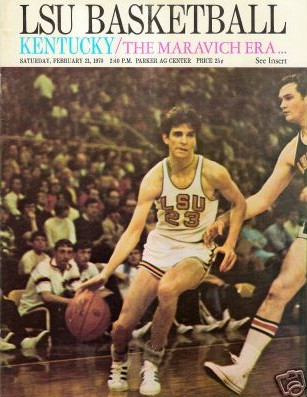


(53:55) Narrator: "By the time the 1960s came to a close, the battle for Civil Rights in SEC Basketball had taken a dramatic turn. Adolph Rupp signed his 1st African American player, Tom Payne in 1969. By 1972 every SEC program was integrated."
True, but they missed a lot...
True, but they missed a lot...
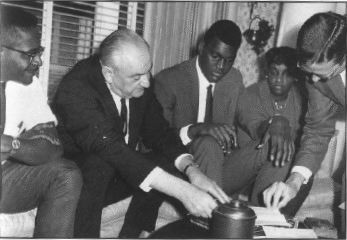
The focus on Rupp is not unexpected. That's what the media has always done. But every single institution has their own story of people who helped integrate their programs. And others who put up barriers. By focusing on Rupp alone, most of that history is whitewashed & forgotten.
And maybe that was by design? ESPN can pat themselves on the back by piling on a convenient scape-goat in Rupp, while not actually digging into anything which might make the majority of SEC fans watching the least bit uncomfortable, or learn anything about their own schools.
@SECNetwork missed many great players from 60s. They interviewed Cotton Nash but didn't mention his feats!? Vandy's Clyde Lee, Georgia Tech's Roger Kaiser, UT's Ron Widby, Florida's Andy Owens & Neal Walk, Auburn's John Mengelt, Georgia's Bob Lienhard, MSU's Leland Mitchell etc.? 







Even with Rupp, they failed to mention that during the 1960's not only did Kentucky become the all-time winningest basketball program in NCAA history, but Rupp became the all-time winningest coach after he overtook E.A. Diddle. A record he held for over 30 years. 

At time coaching record was thought to be 771 wins, which Rupp claimed after 121-95 victory over LSU & Pete Maravich on 27-JAN-1968.
But that was because Rupp's coach, Phog Allen had an inflated record of 770 victories which later was amended down to 746 by NCAA statisticians.

But that was because Rupp's coach, Phog Allen had an inflated record of 770 victories which later was amended down to 746 by NCAA statisticians.
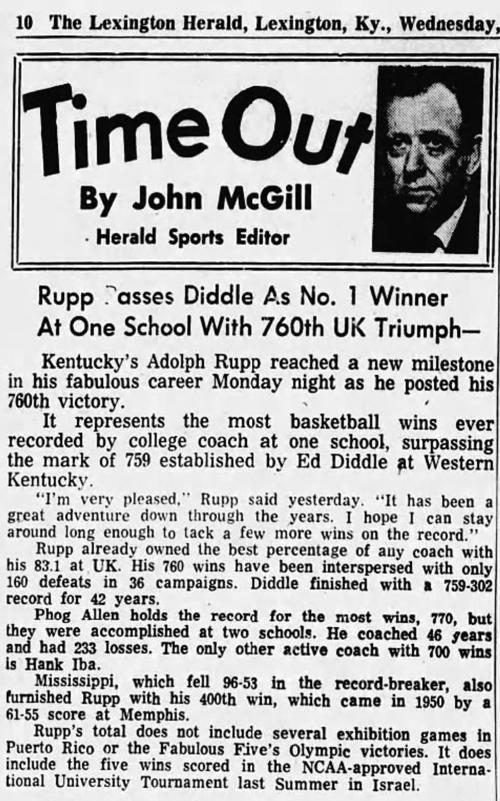

Probably biggest underappreciated influence Rupp had on SEC was to force them to finally take the game of basketball seriously, and to invest in their coaches & facilities, which most did in the 1960s & early 1970s. 







Overall episode was interesting, but another miss. A miss in terms of allowing a few factual inaccuracies & personal biases in, overly focusing on Rupp's recruiting vs. his accomplishments & in process missing a lot of other noteworthy content.
...end 🧵
@threadreaderapp unroll
...end 🧵
@threadreaderapp unroll
• • •
Missing some Tweet in this thread? You can try to
force a refresh

















